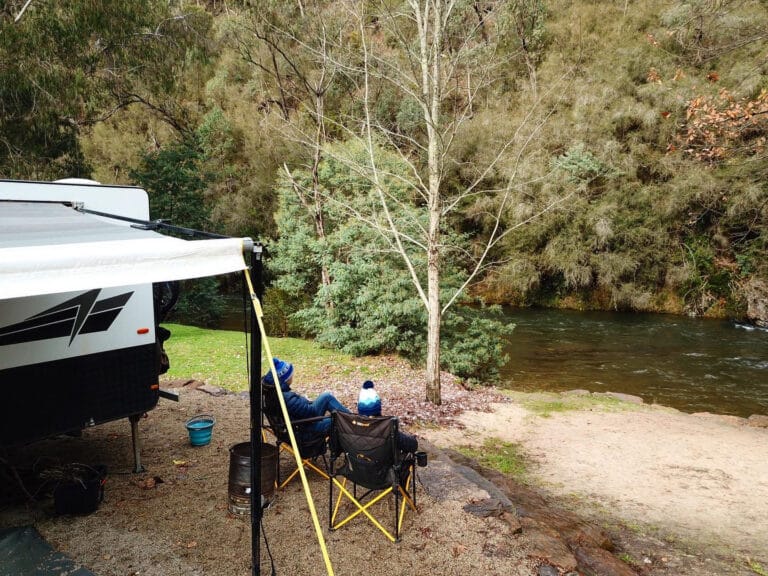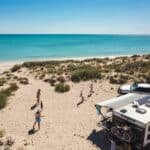Stop and smell the roses for a while, with the help of a few simple tips to keep you on the road longer.
Words Grant Hanan and Linda Bloffwitch & images My Aussie Travel Guide
When there are countless sensational camping options around the country, there’s little wonder more of us are hitting the road these days… for longer. While regularly moving on might appeal to some, others prefer to stop for a while when they’ve found that special spot. Taking things slow by staying put can easily save you money; so let’s show you how to make long-term camping both comfortable and budget-friendly.
Long-Term Camping Choices Caravan Parks
As many parks accommodate travellers looking for long-term stays, rates can often be available at a discount. These costs can significantly vary between the parks, which are often based on your length of stay and the type of set-up you have. There is also a growing trend to have electricity usage calculated on a separate meter for long-term campers. Parks located in popular locations can fill up quickly, so you may need to book 12 months or more in advance to secure your site. Do plenty of research beforehand to help get the best value for your money.
Farm Stays
Another growing trend is a farm stay for those looking for long-term camping – this is where owners offer a patch of land for visitors to camp. Where some stays will provide basic amenities, others expect you to be completely self-sufficient. In return, you could be expected to pay a nominal nightly fee, or perhaps volunteer your time for a bit of work, or donate to a charitable cause.
Free Camping
Many of today’s caravans are set up so they don’t need power for a couple of nights before needing to top up supplies – so being able to free camp is the perfect budget saver. However, if you’re looking to live off the grid for longer than a few nights, you’ll need to consider a few things that you should be carrying to help stretch your stay. With this type of camping option ever-increasing in its popularity, we’ll spend some time covering the long-term free-camping fundamentals.
The Basics
Power
When the modern RV comes with batteries as a 12-volt power source, it will come as no surprise that the amount of battery capacity you use will depend on the items you need to power while camping. This means you need to understand the daily ‘amp hour’ usage you expect to experience, and what time/s of day this will take place.
But how will you replace the amps taken from your batteries? This is where solar comes into play. The aim is for your 12-volt system to be balanced in such a way that your batteries are topped back up well before the sun has left your solar panels.
If you missed the article on solar facts in Issue 07, you can read it by clicking the link above.
The best way of reducing your reliance on battery capacity is to look at recharging items during daylight hours, and using other types of lighting such as headlamps, torches and even some candles. For appliances that you need to run consistently on 240 volts, you’ll need to travel with a generator – keeping in mind that there may be restrictions on generator usage where you’re staying.
Water
Water would have to be one of the major considerations for extending a camp stay – because we simply can’t live without it. So calculating your daily usage, and where you can get more if you run out, will be important factors in determining your length of stay.
While the majority of RVs these days have at least one storage tank, it’s not uncommon to find two or more in some cases. Travelling with multiple tanks that are plumbed to separate outlets not only allows you to manage supplies, it’s also an excellent way to keep good-quality drinking water in one tank, and water that you’ve collected from unknown-quality sources for domestic chores. Filter water before it enters your tanks to remove known contaminants, and boil it before use if necessary.
You can also carry additional water using other methods. Drinking water can be purchased in bulk from supermarkets, and carrying other containers for water (such as a jerry can or two) can go a long way to alleviating the need to pack up and move on because of a water shortage. By far the easiest way to minimise any water issues is to stay close to water – this means you can pretty well take your water concerns out of the equation.
Food
We all need to eat, but how much should you carry? And does some food work better for longer stays? This topic really comes down to personal choice. Starting with a daily meal planner is a good way to calculate the quantity of food you’ll need for the number of days where you’ll be staying.
Mix your meals up by having choices such as vacuum-sealed products, canned meals, dry packaged foods and ingredients for camp oven cooking; all these are perfect for long-term camping. A good tip here is to consider food that doesn’t require refrigeration because the less you need to rely on refrigeration, the better. Taking some time to plan your meals is well worth the effort. No-one wants to pack up and move on because they’re hungry!
Refrigeration
While keeping a bevvie or three cold is really important at any time, we’re sure there are other things that you like to keep cold when travelling. But this is one process that uses a lot of energy, whether you’re relying on a 12-volt compressor-style fridge, or gas for a three-way type. A fridge’s efficiency can be increased by keeping it cool, well packed and ventilated; and try to open the door as little as possible. Adjusting the thermostat nightly can also work wonders for reducing the energy draw.
Gas
Gas is an economical energy source which can go a long way if it’s used wisely. While most of today’s RVs come with a gas supply of some sort, it’s the storage quantities that can vary. Using gas can be a very efficient method for cooking, and heating water; but you can extend your stay even further by using wood for a small campfire, or a combustion-style (or butane) cooker.
Self-Containment
The requirements for being self-contained will differ from place to place, so it’s important
to follow all the rules and regulations. While some free camps provide public toilets, there are many that don’t – so you will need a solution for black water when long-term camping. Your grey water also needs to be treated correctly, and it’s not always permitted to flow straight out onto the ground.
Consider modifying your current set-up to meet self-containment requirements – which will mean your touring has no limits. All general waste should be taken out with you and disposed of appropriately. If you missed the extensive article published about grey water in Issue 006, you can read it via the link above.
Ten tips for an enjoyable long-term free camp stay
1 Look for camps that allow you to have a small fire for cooking with a BBQ plate and camp oven; and even for boiling water.
2 Having a fire means you need a fire management plan – carry an extinguisher, a fire blanket, a rake and a water bucket.
3 A long-handled shovel will come in handy for a variety of chores around your camp – from levelling, clearing debris and fire management to digging deep holes for disposal of organic waste.
4 Consider purchasing and carrying an extra toilet cassette for your black water – thereby doubling your capacity.
5 Carry a range of clamps, fittings and funnels so you’re prepared for any taps you encounter.
6 Travel with a steel bucket with a rope to get water from creeks. It’s robust, and the steel works great on a fire for heating water.
7 Insect management is paramount for free camping, so carry deterrents such as sprays and powders.
8 Have your RV wired for additional solar panels such as the portable type – you can angle them to the sun to collect more watts per day for recharging batteries.
9 If running a generator when camping with neighbours, pick your times wisely. Place it in the shade if possible, and offer your neighbours the opportunity to plug in also. It costs very little in extra fuel, and you may find you will win some new friends!
10 First aid kits and medical supplies will depend a lot on your own personal circumstances; but ensure that you have enough reserves should your plans change and cause you to stay longer.
Long-term camping doesn’t mean you need a caravan with all the bells and whistles. It may simply be an extra tank, a solar panel or a gas bottle that is all you need. It really boils down to having a plan and being prepared. Then the money you save from your first long-term stay will quickly cover the extra days the next time you visit a caravan park. And that’s a win-win all round!












